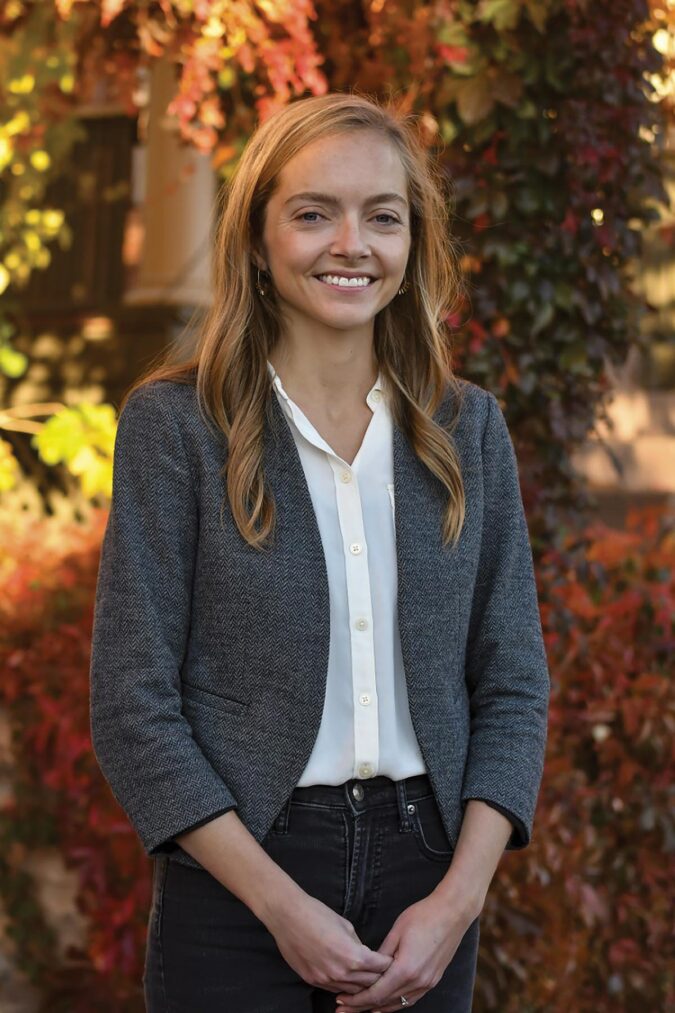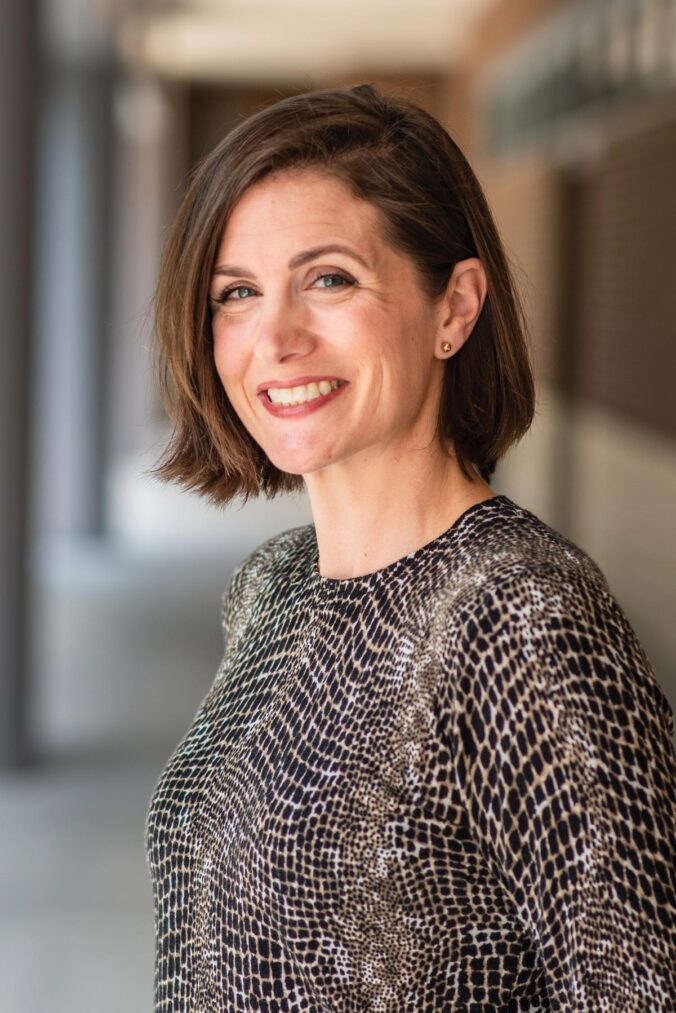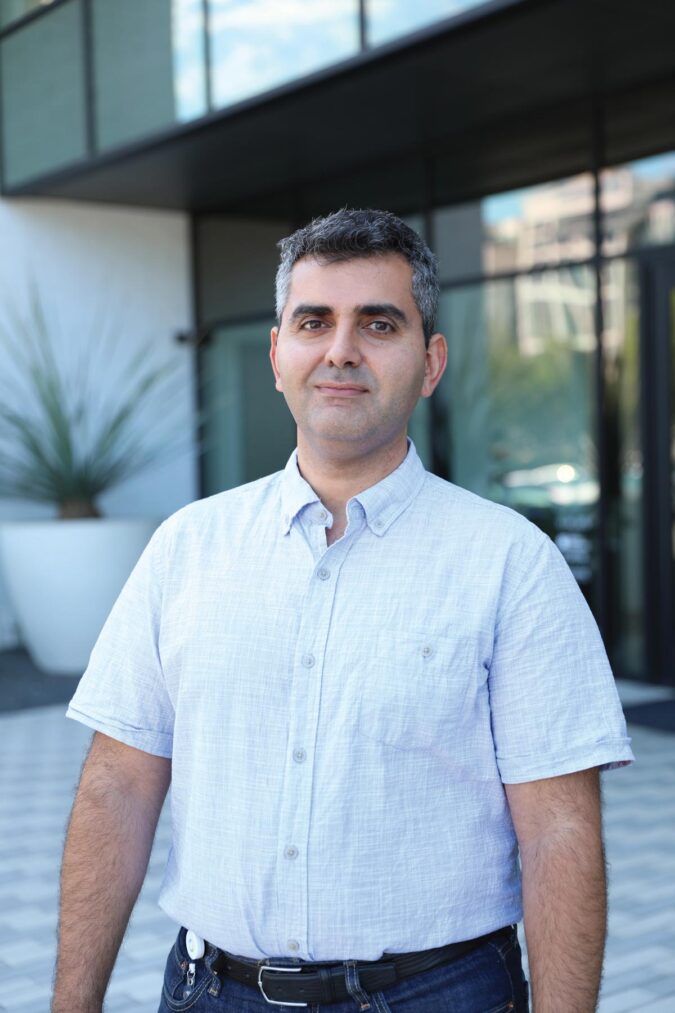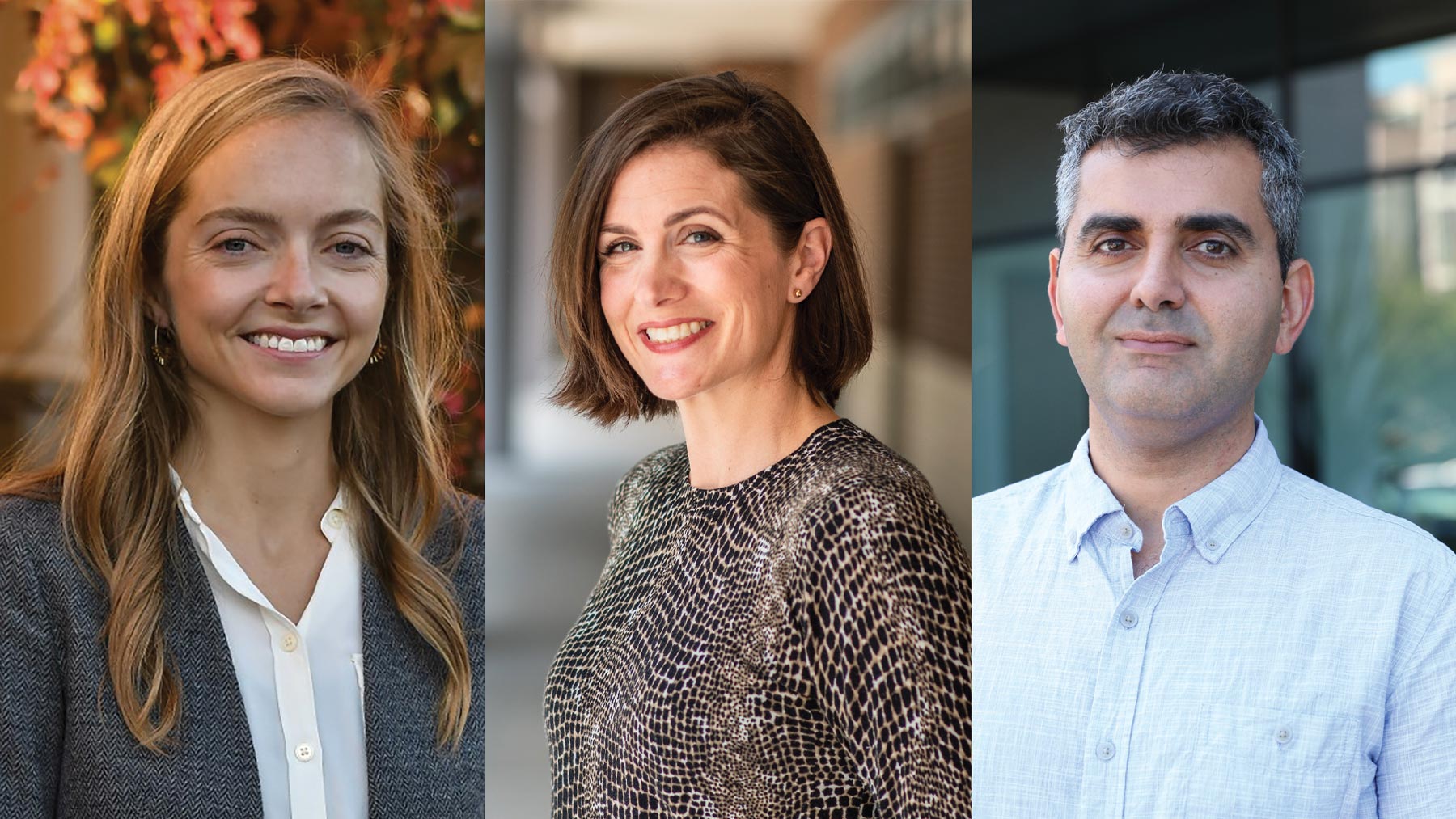Developing Tech to Track Health Changes
Shelby Bachman, PhD
Shelby Bachman knew early on she wanted to study the brain, aging and memory. Her interest arose from having a grandfather with Alzheimer’s disease and an early introduction to neuroanatomy while still in high school.
Bachman’s undergraduate and graduate education focused deeply on these topics, and she now works for a biotech company called VivoSense. In her role, she uses wearable sensor data to develop digital measures of clinical changes that occur due to disease.

As a neuroscience major at USC, Bachman discovered the USC Leonard Davis School of Gerontology in her junior year. She worked as a research assistant in the lab of Mara Mather, professor of gerontology, psychology and biomedical engineering.
“Working in Dr. Mather’s lab was an invaluable experience,” Bachman says. “The projects I assisted with involved running behavioral experiments with younger and older adults. I learned how to analyze data and put together a story to answer a research question.”
After graduating, Bachman realized that her real passion was research, so she enrolled in a master’s program at the Humboldt University of Berlin, Germany. Coincidentally, Mather had just finished a sabbatical at Berlin’s prestigious Max Planck Institute for Human Development.
Bachman ended up collaborating with Mather at the Max Planck Institute. Their work focused on a brain region called the locus coeruleus that lies deep in the subcortex. Scientists think the locus coeruleus is important for cognitive function in aging and Alzheimer’s disease. This project led Bachman back to the USC Leonard Davis School to pursue a PhD in Mather’s lab.
In completing the diverse coursework available through the PhD program, Bachman gained a multidisciplinary perspective of aging and strong data-science skills. Her dissertation work involved a range of research projects. For one project, she conducted a behavioral experiment to measure how cognitive performance changed after briefly squeezing a therapy ball. The study’s results showed that a short period of isometric exercise improved working memory performance in both older and younger participants.
She also participated in a labwide study examining the effects of slow-paced breathing on the sympathetic nervous system in younger and older adults. Slow-paced breathing increases heart rate variability, which is important for emotional well-being and stress management. For this study, Bachman collected and analyzed large amounts of brain-imaging data and prepared several publications.
“My PhD research was a full-spectrum experience,” says Bachman. “I learned how to manage a project, including recruiting participants and overseeing a team of research assistants. I gained experience in collecting and analyzing large sets of physiological and brain-imaging data. I also gained experience publishing my results and presenting to very different audiences.”
Bachman completed her PhD in May 2022 and started working at VivoSense as a research scientist shortly after. VivoSense develops digital measures from wearable sensor data for use in clinical trials.
Bachman’s work builds upon her PhD research measuring physiological signals. “My work centers around the development of digital clinical measures for people with Alzheimer’s and cancer,” she says. “We are excited about the possibility of using a wearable accelerometer
to capture functional changes. An accelerometer measures aspects of gait and mobility such as steps, walking speed and stride length.”
Wearables generate large data sets. The data-science skills Bachman developed at USC are helping her analyze and interpret this data. She’s also thinking about her work from policy, insurance and population-level perspectives. Bachman credits the multidisciplinary training she received at the USC Leonard Davis School for this broad view.
Looking to the future, Bachman sees the potential of wearables and other types of sensors to help solve some of the challenges of aging. “I’m excited to be contributing my background to this work and seeing where the digital health field goes,” she says.
 Protecting Older Adults From Fraud
Protecting Older Adults From Fraud
Nichole Lighthall, PhD
Nichole Lighthall earned her PhD from the USC Leonard Davis School of Gerontology in 2012. She’s now an associate professor of psychology at the University of Central Florida. In her view, research is an opportunity to solve problems and make the world a better place. Indeed, her current work on the effects of aging on decision-making aims to protect older adults from scams.
According to the FBI’s annual Elder Fraud Report, more than 92,000 victims reported losses totaling $1.7 billion in 2021. This amount is likely just a fraction of the actual losses, since many cases of fraud and abuse go unreported.
Lighthall teaches undergraduate and graduate classes at UCF and runs her own lab. Her research builds upon her previous work in decision-making at the USC Leonard Davis School and as a postdoctoral researcher at Duke University.
One of Lighthall’s current projects at UCF is identifying predictors of vulnerability to scams and fraud. Her team is developing a screening tool to help health care providers identify older adults at higher risk of getting scammed.
“You might think cognition and markers of decision-making would be the top predictors of risk,” Lighthall says. “But it’s more complex than that. Some older adults know their children are taking advantage of them but don’t stop it from happening. Others may be experiencing chronic pain or illness that makes them dependent on the person stealing from them. Our multidisciplinary team is looking at this problem from all angles.”
At the USC Leonard Davis School, Lighthall’s coursework encompassed the whole picture of aging and included topics such as public policy, sociology, biology, psychology and epidemiology. During classes, weekly meetings and seminars, she interacted with a wide range of people with diverse interests in aging.
For several years, Lighthall received support from a T32 training grant under the supervision of University Professor Eileen Crimmins. “The training program was transformative,” Lighthall says. “As fellows, we learned together and shared our experiences. The grant also provided funding so I could focus on research instead of working as a teaching assistant.”
With her principal advisor, Professor Mara Mather, Lighthall studied how short-term stress affected learning and decision-making.
“You can imagine the evolutionary benefit of stress when it causes you to pay attention to important information in your environment,” Lighthall says. “This mechanism helps you avoid potentially harmful experiences and make rewarding choices in the future.” Lighthall and Mather also studied gender and age differences in decision-making under stress.
In addition to Mather and Crimmins, Lighthall found other mentors at the USC Leonard Davis School. Professor Elizabeth Zelinski shared Lighthall’s interest in cognitive psychology and provided keen guidance when she started thinking about her future. University Professor Caleb Finch was also a role model for Lighthall for his long and productive career.
Even years later, Lighthall keeps in touch with her USC Leonard Davis School colleagues. “These are people I’ve built strong bonds with,” she says. “I lean on them as part of my professional network and as my sounding board for professional issues.”
For Lighthall, following one’s passion is the key to sustaining a long career. As a first-generation undergraduate student at the University of California, Berkeley, Lighthall discovered a keen interest in psychology.
That interest led to a summer research fellowship at Stanford University to study stress as a risk factor for age-related cognitive decline, which then led her to Mather at the USC Leonard Davis School. As Lighthall completed her PhD, a love of research and mentoring students inspired her to pursue an academic path.
Recently, Lighthall received an invitation to join the Global Young Academy (GYA), an organization that aims to empower young scientists. During her five-year GYA term, she will be working in multidisciplinary and multinational teams to address scientific and societal problems.
Throughout her education and career, Lighthall has taken a problem-focused approach. “Helping people and seeing the positive outcomes of my work is very satisfying,” she says.
 Unlocking the Cellular Processes of Aging
Unlocking the Cellular Processes of Aging
Amin Haghani, PhD
Amin Haghani started researching viruses in his home country of Iran more than 15 years ago. He already had a doctor of veterinary medicine degree, but his desire to focus on research led him down a different academic path and, eventually, to the U.S.
“When I came here, I wasn’t aware of the field of gerontology,” Haghani says. “My goal was to obtain a PhD and become a researcher.” Finding the USC Leonard Davis School of Gerontology helped Haghani discover his passion and land a senior role at Altos Labs, a state-of-
the-art biotechnology company. Seeded with more than $3 billion, Altos has an ambitious goal of reversing aging at the cellular level.
Haghani left Iran in 2013 to study molecular biology at Universiti Putra Malaysia. There, he had the opportunity to study and publish papers on various viruses. He then moved to the U.S. after graduating with a master’s degree.
“Instead of enrolling in a PhD program right away, I decided to work in a lab first,” Haghani says. “I applied for several positions, including one with University Professor Caleb Finch at the USC Leonard Davis School.”
Finch responded right away. He was impressed with Haghani’s résumé and research experience. Within two weeks, Haghani was working in the lab as a research technician.
“Dr. Finch knew I wanted to pursue a PhD, so he trusted me to work on many projects,” Haghani says. One of the projects that would carry over into his own PhD work was investigating the toxicity of air pollution on the brain.
It didn’t take long for Haghani to realize he was in the right place. After 10 months as a research technician, he applied for and was accepted to the PhD program in Biology of Aging.
A prolific researcher during his PhD completion, Haghani explored different aspects of air pollution in Finch’s lab and with other collaborators. These projects included:
- Identifying the inflammatory pathways that mediate the effects of air pollution on the brain.
- Collaborating with Professor Sean Curran to develop a model of air pollution toxicity in the worm C. elegans.
- Partnering with UCLA Professor Steve Horvath to investigate DNA methylation in response to air pollution.
Using his biostatistics skills, Haghani also participated in an epidemiological study with University Professor Eileen Crimmins. The study measured the effects of smoking on health outcomes in older women and led to publication in PLOS ONE. In total, Haghani published more than 10 papers while pursuing his PhD, which he completed in May 2020.
“USC is such a collaborative place,” Haghani says. “When I reached out to professors with ideas, they were always responsive and willing to work together.”
His research with Horvath led to a postdoctoral fellowship at UCLA and his new position as a senior scientist at Altos. The company’s mission is to reverse disease, injury and disabilities that occur throughout life by restoring cell health and resilience.
Haghani’s work looks at how epigenetic changes to DNA (those that regulate gene expression without altering DNA sequences) affect aging. DNA methylation is a type of epigenetic change that occurs with age and in response to physiological and environmental stress.
Haghani measures DNA methylation across over 300 mammalian species to help identify shared epigenetic biomarkers of aging. His and his Altos Labs colleagues’ work in finding molecular mechanisms of cellular damage will hopefully lead to advances in longevity and resilience and the development of anti-aging treatments.
He says the startup culture moves quickly, so it’s hard to predict where things will be in a few years. A return to an academic setting someday is not out of the question.
And Haghani is still in contact with Finch and others at USC. “Dr. Finch and I meet for lunch every few months to catch up and share ideas,” he says. “I also recently attended an alumni dinner and saw many of my former professors and colleagues. I respect them so much and see them as friends.”





